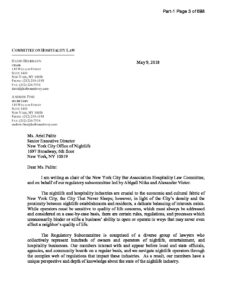In 2018, the Committee on Hospitality Law of the New York City Bar Association submitted a letter to the Office of Nightlife describing ways in which the SLA and Community Boards Impose Conditions on License Applicants and predicting that the repeal of the Cabaret Law will result in the de facto continuation of a near prohibition of dancing within the City of New York.
https://s3.amazonaws.com/documents.nycbar.org/files/2017343-NightlifeOfficeIntro_FINAL_5.9.18.pdf.
The Office of Nightlife did not fully understand this letter. In its report the following year, the ONL did recommend one recommendation from the Committee. The letter stated:
For these reasons, we would like to work with the Nightlife Taskforce to develop a more consistent, uniform procedure that can be adopted by all Communities Boards, as well as a more universal list of issues, documents, or requirements an applicant may or must provide or address.
The ONL adopted this suggestion as a recommendation, but missed the implicit point that all of the procedures of the SLA and Community Boards needed reform.
“As it currently stands, the Resolution will result in the de facto continuation of a near prohibition on dancing within the City of New York.”
***
“As attorneys involved in the process of the acquisition of liquor licenses and other related permits, we have seen many occasions where Community Boards have taken unanimous positions against license applications for what appear to be minor or irrelevant issues, such as a restaurant’s proposed menu, or based on highly subjective views of a neighborhood’s past history as opposed to its current or future composition and character. These resolutions may well get rejected by the State Liquor Authority; however, this uncertainty coupled with the time and cost of challenging the Board’s resolution at the SLA places a business owner in a fraught financial predicament.
***
At present, only large businesses may have the resources to take disputes to the SLA to overturn community board stipulation requirements that cannot reasonably be met.
***
More and more, community boards are seeking to place a moratorium on all on-premises licenses in New York City. In addition, many community boards have created a standard set of stipulations and use their substantial power to force new licensees to agree to terms and conditions that stand in the way of what would be a well-run operation.
